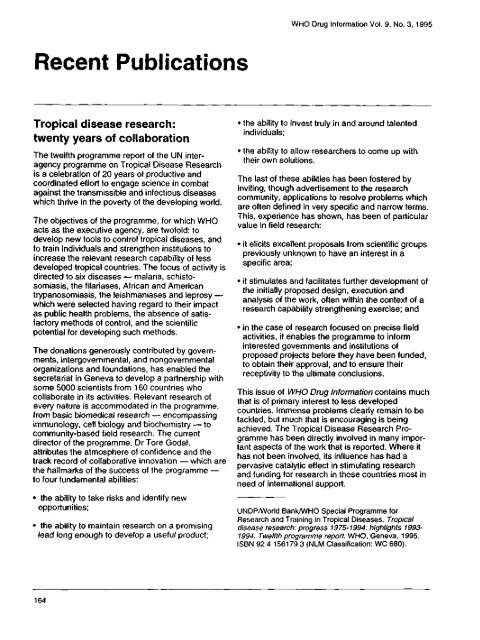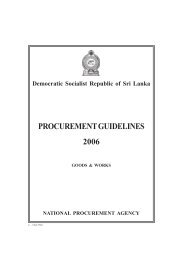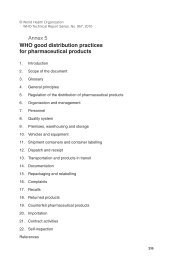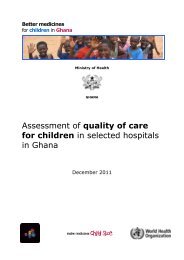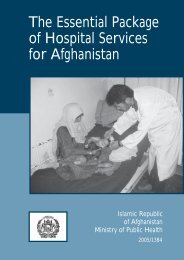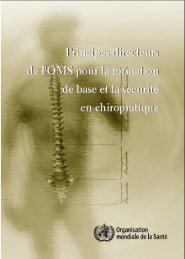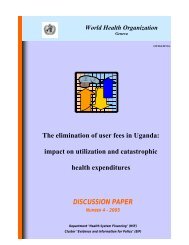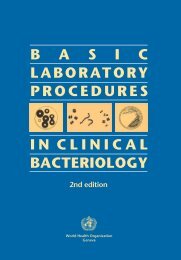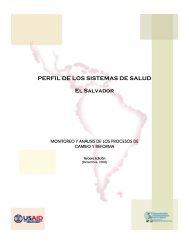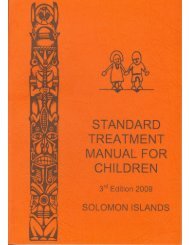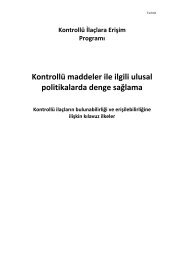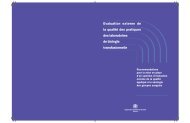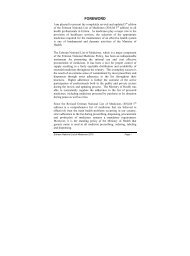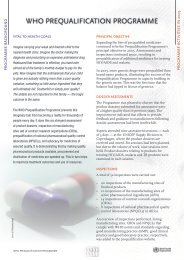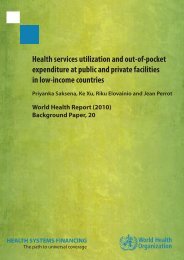WHO DRUG INFORMATION - World Health Organization
WHO DRUG INFORMATION - World Health Organization
WHO DRUG INFORMATION - World Health Organization
Create successful ePaper yourself
Turn your PDF publications into a flip-book with our unique Google optimized e-Paper software.
Recent PublicationsTropical disease research:twenty years of collaborationThe twelfth programme report of the UN interagencyprogramme on Tropical Disease Researchis a celebration of 20 years of productive andcoordinated effort to engage science in combatagainst the transmissible and infectious diseaseswhich thrive in the poverty of the developing world.The objectives of the programme, for which <strong>WHO</strong>acts as the executive agency, are twofold: todevelop new tools to control tropical diseases, andto train individuals and strengthen institutions toincrease the relevant research capability of lessdeveloped tropical countries. The focus of activity isdirected to six diseases — malaria, schistosomiasis,the filariases, African and Americantrypanosomiasis, the leishmaniases and leprosy —which were selected having regard to their impactas public health problems, the absence of satisfactorymethods of control, and the scientificpotential for developing such methods.The donations generously contributed by governments,intergovernmental, and nongovernmentalorganizations and foundations, has enabled thesecretariat in Geneva to develop a partnership withsome 5000 scientists from 160 countries whocollaborate in its activities. Relevant research ofevery nature is accommodated in the programme,from basic biomedical research — encompassingimmunology, cell biology and biochemistry — tocommunity-based field research. The currentdirector of the programme, Dr Tore Godal,attributes the atmosphere of confidence and thetrack record of collaborative innovation — which arethe hallmarks of the success of the programme —to four fundamental abilities:• the ability to take risks and identify newopportunities;• the ability to maintain research on a promisinglead long enough to develop a useful product;• the ability to invest truly in and around talentedindividuals;• the ability to allow researchers to come up withtheir own solutions.The last of these abilities has been fostered byinviting, though advertisement to the researchcommunity, applications to resolve problems whichare often defined in very specific and narrow terms.This, experience has shown, has been of particularvalue in field research:• it elicits excellent proposals from scientific groupspreviously unknown to have an interest in aspecific area;• it stimulates and facilitates further development ofthe initially proposed design, execution andanalysis of the work, often within the context of aresearch capability strengthening exercise; and• in the case of research focused on precise fieldactivities, it enables the programme to informinterested governments and institutions ofproposed projects before they have been funded,to obtain their approval, and to ensure theirreceptivity to the ultimate conclusions.This issue of <strong>WHO</strong> Drug Information contains muchthat is of primary interest to less developedcountries. Immense problems clearly remain to betackled, but much that is encouraging is beingachieved. The Tropical Disease Research Programmehas been directly involved in many importantaspects of the work that is reported. Where ithas not been involved, its influence has had apervasive catalytic effect in stimulating researchand funding for research in those countries most inneed of international support.UNDP/<strong>World</strong> Bank/<strong>WHO</strong> Special Programme forResearch and Training in Tropical Diseases. Tropicaldisease research: progress 1975-1994: highlights 1993-1994. Twelfth programme report. <strong>WHO</strong>, Geneva, 1995.ISBN 92 4 156179 3 (NLM Classification: WC 680).


